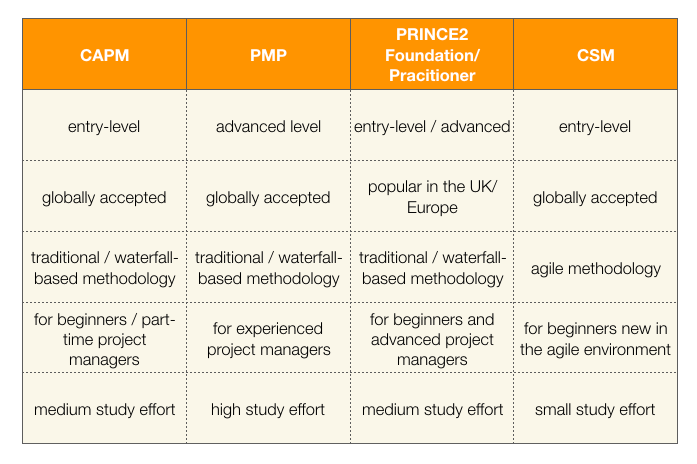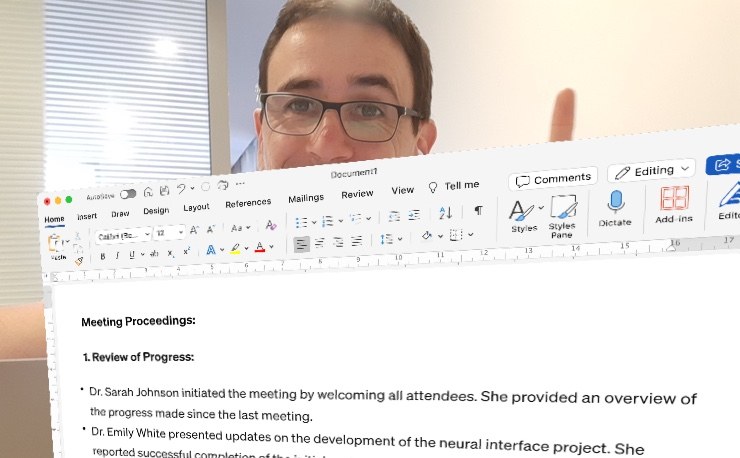Deciding which project management certification to take can be quite overwhelming. There are many different programs, all having different requirements. If you are thinking about getting certified, this article will help you.

Here are the certifications we’ve included in our comparison:
- CAPM: Certified Associate in Project Management
- PMP: Project Management Professional
- PRINCE2: Projects in Controlled Environments
- CSM: Certified Scrum Master
Should you get a certification?
“Never ask a barber if you need a haircut” – Warren Buffett
If you ask any of the major training providers or project management bodies like PMI whether you should get certified, guess what the answer will be? These institutions have an interest in selling you training courses and charging a lot of money for it.
So, be very careful about whose opinion you ask for.
I’d like to give you a more balanced view, not to say unbiased. That’s because I don’t have a certification and never thought of getting one.
Getting certified will increase your chances when applying for a job. That’s the main benefit of the whole game.
In today’s crowded job market with online job listings receiving hundreds of applications (mostly from people not suitable for the role), companies are looking for ways to filter candidates in an efficient way.
Putting yourself into the shoes of a recruiter, whom do you think he’s going to invite for an interview if the candidates have similar work experience, but one has got a PMP? It’s most likely the holder of the PMP.
I have my PMP, not because I think it was an important certification, but because it’s a filter when job hunting.
The other advantage of studying for a PM certificate is that it will familiarize yourself with modern project management methodology.
What do I mean by “project management methodology”? It’s the processes, tools and techniques that project managers have developed over the years to ensure a project will go well.
For example, a PM methodology will teach you:
- How to break down a project into manageable pieces
- How to better understand the customer’s requirements
- How to evaluate the quality of a project
- How to budget a project and manage cost
Having a repertoire of tools and systems in project management can be very beneficial for your own work.
To give you an example: Seasoned project managers know that it’s a good practice to conduct a risk assessment when planning a project and to take measures to mitigate those risks. You will face less trouble and be more focused along the way.
If nobody ever told you about risk assessments and how they are carried out, you would never be able to apply the concept in your own projects.
Could you learn the same from a $20 book? Absolutely.
There’s one thing though that a book can’t provide, which is accountability. Who would attempt to memorize 150 questions (and the corresponding answers) from a book if there wasn’t an exam upcoming testing those questions (and you having paid a significant amount of money)?
Only a rigorous certification program can provide this kind of accountability.
How to go about deciding whether to get certified or not?
If you’ve been managing projects successfully for the past five years and if you’re part of an organization that’s already using some sort of project management methodology, getting certified won’t help you much (unless you are looking to apply externally).
On the other hand, if the company you’re working at currently doesn’t follow any kind of structured project management process, it could be an interesting option for you to get certified and help implement internal systems for how projects are run.
What if you are not a project manager yet?
Focus on building relevant experience leading small projects or other initiatives. Forget about getting a certification, as it won’t help you finding a project manager job.
A PM certificate is not a ticket to a project manager job, if you don’t have any previous experience.
Ultimately, it is experience that greatly increases your chances as a project management job candidate, as well as your chances of completing projects successfully. Over time, you build a history of successfully dealing with issues, helping you get smarter with every project.
Keep in mind that getting certified is a big investment both time-wise and financially. People prepare for their exams months in advance and spend hundreds of dollars on educational material like online courses, books and training material.
CAPM: Certified Associate in Project Management
The certificate: The CAPM is a beginner-level certification program suitable for everyone with little or no project experience.
You may be coordinating projects as part of your job without being a project manager by title, or you want to grow into a full-time project manager position. In both cases, the CAPM will be a good choice.
The CAPM is run by the Project Management Institute (PMI), which also backs the PMP.
Prerequisites: You need to have a secondary degree (high school diploma or equivalent) and 1,500 hours of project experience. If you don’t bring the necessary project experience, you can alternatively take 23 hours of project management education, whether it’s in the form of an online course or an evening class (it must be an accredited course though.)
For a good CAPM prep course, check out Master of Project’s CAPM Certification training. This is an online course which counts against the 23 hours.
Time investment: You can get yourself ready for the exam in 1 month provided you devote a good amount of time on studying. For most people 3 months is a more realistic time frame for getting prepared.
The exam: The certification exam has 150 multiple choice questions, and you have three hours to complete it. In order to maintain your CAPM, you must retake the exam every five years.
Cost: The exam costs around $300. Discounts are offered to members of the Project Management Institute (PMI).
PMP: Project Management Professional
The certificate: The PMP is one of the most prestigious certificates in project management. It’s also one of the most difficult to pass because of the amount of knowledge one needs to absorb and the time required to prepare for the exam.
Unlike other certificates like the CAPM, the PMP requires previous work experience as a project manager. When registering for the exam, candidates have to submit proof that they have accumulated at least 4,500 hours in an active role leading and managing projects.
More information about the PMP
Prerequisites: The prerequisites vary depending on your educational background. Assuming you have completed a four-year degree program (college, university), you need to have at least 4,500 hours of leading projects. In addition, you need to take 35 hours of project management training.
Step by step guide: How to get PMP certified
For candidates without an academic background, the requirements are even higher: 7,500 hours leading and directing projects plus 35 hours of project management education are required in order to apply for the PMP.
The PMBOK is the bible of project management. Get it here!*
The exam: The exam covers multiple choice questions covering all stages of the project lifecycle — from initiation through execution to closing. The 4-hour exam requires stamina and the questions are tricky. There are multiple plausible answers but there are is one correct answer.
Like the CAPM, the PMP is not a certification you earn once and then maintain for life. You have to keep studying project management material, extend your knowledge and earn 60 so-called professional development units (PDUs) in a 3 years cycle. There is a huge offer of online courses and podcasts which allow you to earn PDUs, making it relatively convenient to study in parallel to your other obligations.
What do former PMP students say about the program?
Studying for the PMP was worth it alone. I learned a lot of valuable information that I will apply to current and future projects. It exposed me to a lot of good practices and structure that is sadly missing from most of company/government project management. Even though I didn’t like spending the money for study materials, I think it paid for itself in what I learned.
Most people say the exam was very hard to pass:
I got mine [the PMP] six years ago and it is a bear to study for and pass. But it’s gotten me interviews, that’s for sure.
Time investment: The general guideline is around 100 hours of studying, in addition to the 35 hour course you take.
Cost: The current cost for the PMP certificate is $555 for non-PMI members and $405 for members of the PMI network. Additionally cost for exam preparation and renewal of your PMP have to be factored in as well.
PRINCE2: PRojects IN Controlled Environments
 Project management for royals? Nope. PRINCE2 is a modern project management methodology originally developed for the British governmental sector.
Project management for royals? Nope. PRINCE2 is a modern project management methodology originally developed for the British governmental sector.
It is less known outside of Europe.
Like the CAPM and PMP philosophy, PRINC2 also breaks down the project management process into sub-processes (initiation, execution, closing etc.) and provides methods for controlling each stage.
The certificate: Depending on your professional experience, there are different programs you can choose from. The PRINCE2 Foundation exam is similar to CAPM and suitable for beginners to project management. It’s helpful when you’re not yet actively leading projects. Moreover, it’s a prerequisite for taking any of the advanced PRINCE2 certifications.
As the name suggests, the PRINCE2 Practitioner exam is for everyone managing projects. The exam tests your ability to apply the principles taught by PRINCE2 in your own projects.
With agile methods become more and more popular, PRINCE2 has also created an Agile Practitioner Exam. It’s a blend of the PRINCE2 methodology and modern agile philosophies like Scrum and Kanban.
Prerequisites: There are no prerequisites for the Foundation exam, but being familiar with project management terminology certainly helps. The requirements for the Practitioner exam are even higher and can be found here.
Time investment: If you have the opportunity to study full-time, take the 1-week long course where you sit the foundation exam on day 3 and the practitioner exam on day 5.
The exam: The Foundation exam consists of 60 multiple choice questions which have to be answered in one hour. Sounds like a lot? Don’t worry. In order to pass you’ll only need to answer 33 questions correctly. The Practitioner exam is a 150 minute exam covering 68 questions (in the 2017 version) of which 38 have to be answered correctly.
Cost: Exam cost vary depending on the training provider you select. Some training providers bundle study material and the exam fee in one package, while others require you to pay separately for the exam.
It is best to find a PRINCE2 training provider in your area and get an individual quote. What’s for sure: If you take an online preparation course you can save hundreds of $. As a rough guidance, fees for the Foundation exam vary between $250 and $350 while the Practitioner exam costs a bit more.
CSM: Certified Scrum Master
The certificate: If you are working in IT, the Scrum Master is the way to go. The agile methodology (and in particular the Scrum method) has become the standard in software development, and you are most likely going to be asked about agile if you are interviewing for an IT job.
If you’ve never heard of agile: It is a more flexible and iterative approach to project management. You refine the product (e.g. a software) in several steps or sprints instead of doing all in one go. Throughout each sprint you keep working closely together with your customer to make sure what you’re developing actually meets the customer’s needs.
Prerequisites: In order to earn the CSM certificate, you need to take a Scrum course with an authorized trainer (Certified Scrum Trainer). Scrum courses are typically two-day seminars that are offered in every major city.
Time investment: Mandatory 2-day course plus a bit of preparation.
The exam: 35 multiple choice questions, 24 of which have to be answered correctly. According to people who have taken it, the exam isn’t very difficult.
Cost: Around $1000 for the 2-day CSM course.
Comparison table
I created this simple overview to help you compare the different programs.

Conclusion
Getting certified in project management can help you boost your career, provided you already have some experience leading and managing projects.
For those of you who want to get into project management, the CAPM exam is a good choice. For those with several years of project management experience, the PMP is the certification to go after.
For anyone trying to enter the software development realm, the CSM is a good option.
Remember though that it’s not formal credentials that make great project managers. It is your experience and your people management skills that matter most.
If you have any questions, share them in the comments.
Author
-
Hi! I'm Adrian, former Senior IT Project Manager and founder of Tactical Project Manager. I created the site to help you become an excellent project leader and manage intense projects with success!




